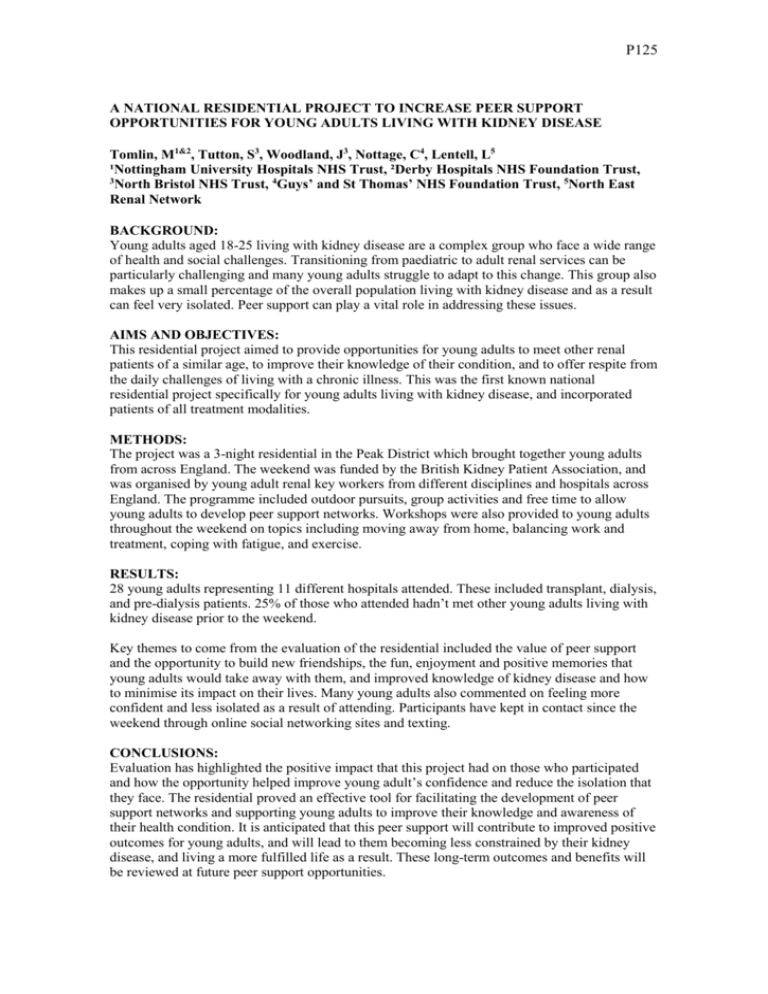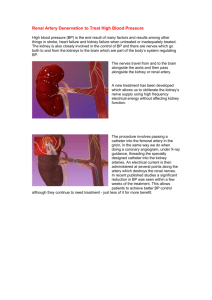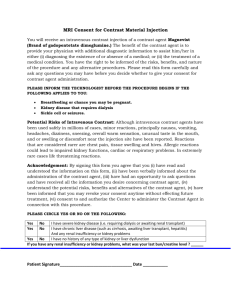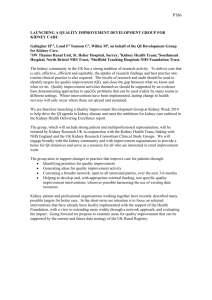A national residential project to increase peer support opportunities
advertisement

P125 A NATIONAL RESIDENTIAL PROJECT TO INCREASE PEER SUPPORT OPPORTUNITIES FOR YOUNG ADULTS LIVING WITH KIDNEY DISEASE Tomlin, M1&2, Tutton, S3, Woodland, J3, Nottage, C4, Lentell, L5 ¹Nottingham University Hospitals NHS Trust, ²Derby Hospitals NHS Foundation Trust, 3 North Bristol NHS Trust, 4Guys’ and St Thomas’ NHS Foundation Trust, 5North East Renal Network BACKGROUND: Young adults aged 18-25 living with kidney disease are a complex group who face a wide range of health and social challenges. Transitioning from paediatric to adult renal services can be particularly challenging and many young adults struggle to adapt to this change. This group also makes up a small percentage of the overall population living with kidney disease and as a result can feel very isolated. Peer support can play a vital role in addressing these issues. AIMS AND OBJECTIVES: This residential project aimed to provide opportunities for young adults to meet other renal patients of a similar age, to improve their knowledge of their condition, and to offer respite from the daily challenges of living with a chronic illness. This was the first known national residential project specifically for young adults living with kidney disease, and incorporated patients of all treatment modalities. METHODS: The project was a 3-night residential in the Peak District which brought together young adults from across England. The weekend was funded by the British Kidney Patient Association, and was organised by young adult renal key workers from different disciplines and hospitals across England. The programme included outdoor pursuits, group activities and free time to allow young adults to develop peer support networks. Workshops were also provided to young adults throughout the weekend on topics including moving away from home, balancing work and treatment, coping with fatigue, and exercise. RESULTS: 28 young adults representing 11 different hospitals attended. These included transplant, dialysis, and pre-dialysis patients. 25% of those who attended hadn’t met other young adults living with kidney disease prior to the weekend. Key themes to come from the evaluation of the residential included the value of peer support and the opportunity to build new friendships, the fun, enjoyment and positive memories that young adults would take away with them, and improved knowledge of kidney disease and how to minimise its impact on their lives. Many young adults also commented on feeling more confident and less isolated as a result of attending. Participants have kept in contact since the weekend through online social networking sites and texting. CONCLUSIONS: Evaluation has highlighted the positive impact that this project had on those who participated and how the opportunity helped improve young adult’s confidence and reduce the isolation that they face. The residential proved an effective tool for facilitating the development of peer support networks and supporting young adults to improve their knowledge and awareness of their health condition. It is anticipated that this peer support will contribute to improved positive outcomes for young adults, and will lead to them becoming less constrained by their kidney disease, and living a more fulfilled life as a result. These long-term outcomes and benefits will be reviewed at future peer support opportunities.







